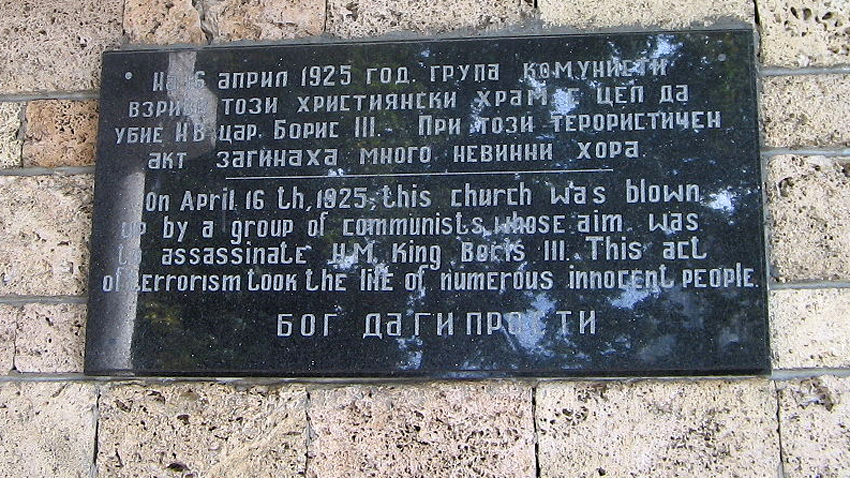It is exactly 90 years on April 16, since the bomb attack on the St. Nedelya church in Sofia. This is one of the bloodiest political terrorist attacks in world history. The events in April 1925 are a tragic stage in the political crisis in Bulgaria in the wake of the country’s defeat in World War I. In June 1923, after a series of errors, the left-wing government of the Agrarian Union was overthrown in a military coup and the attempted rebellion against the new right-wing government that ensued was crushed. The communist party got involved in the events late after pressure from the Communist International which made an erroneous evaluation of the situation in Bulgaria. So it came about that the September uprising the communist party headed was routed. Yet it continued its political line towards an armed struggle. In May 1924, a conference took place on Mount Vitosha at which an underground military organization was set up, headed by Major Kosta Yankov.
As historian Prof. Lyudmil Spassov says in an interview for Radio Bulgaria, the revolutionary options were limited – the agrarians and the communists had already been crushed in 1923.
“The Soviet agents who came here in 1924 ascertained that the communists in Bulgaria number 2-3,000, 800 of whom were in Sofia.”
A silent civil war was being waged in Bulgaria, with casualties on both sides, killed most often in acts of terrorism. The ruling right-wing administration of Prime Minister Alexander Tsankov also resorted to terrorist acts - some of the assassinations were probably the work of the state’s repressive bodies. At the end of 1924 the military organization of the communists planned a major act of terrorism to deal a blow against the state bodies of repression. Meanwhile, Prof. Lyudmil Spassov says, a coup was in the making against the Tsankov cabinet, planned by leftist generals and rightist agrarians. Moscow, which was well informed of the developments unfolding, advised the Communist party to support the coup. But the Bulgarian communists saw the terrorist attack as but a prelude to an uprising, yet no such uprising was organized.
Developments hurtled ahead and got out of hand. Several left-wing politicians were assassinated. On 14 April, 1925 the Communist International finally came to the right decision – they advised the communists in Bulgaria to reject the line towards armed uprising. But it was too late. That was also the day when General Konstantin Georgiev was assassinated. It was decided to blow up the St. Nedelya church at his burial service that would bring together the elite of the country.

“Konstantin Georgiev was not just anyone. He was top brass but also chair of the Democratic Alliance – the ruling party at the time. This meant that his burial service in St. Nedelya, which had been rigged with 25 kg. of dynamite, would bring together the country’s entire political and military elite,” Prof. Spassov says further. “At 3 PM on April 16 the burial service began with such a throng – military officers, MPs, cabinet ministers, leading economic and cultural figures – that Metropolitan Bishop Stefan had to ask to have the coffin and the cabinet ministers move towards the pulpit to make room for the incoming people. At 20 minutes past 3 the dynamite went off. Insignificant quantities of poison gas had also been smuggled into the church. More than 130 people were killed outright, but more died of their wounds and of the poison gas in the days that followed. The final death toll was 213; 500 had been wounded.”
In retaliation the authorities began widespread arrests. Many people were killed, among them intellectuals who had not been involved in the armed struggle, like journalist Joseph Herbst and poet Geo Milev, a foremost figure in Bulgarian modernism. Thus April 1925 was the month that marked the deepest and most tragic rift that has ever divided the Bulgarian nation.
English Milena Daynova
On November 25, the Bulgarian Orthodox Church honours the memory of St. Clement of Ohrid – a distinguished archbishop, teacher and scholar. He was among the most prominent disciples of the brothers Cyril and Methodius, the Holy Seven Apostles – the..
On November 24, the Bulgarian Orthodox Church honors St. Catherine (Sveta Ekaterina in Bulgarian) , who was one of the most educated women of her time. She lived in the late 3rd and early 4th centuries and came from a noble family in Alexandria...
The Patriarchal Cathedral of St Alexander Nevsky is celebrating its temple feast today. The cathedral, a symbol of the Bulgarian capital, was built "in gratitude to the Russian people for the liberation of Bulgaria from Ottoman rule in 1878". Who..

+359 2 9336 661
